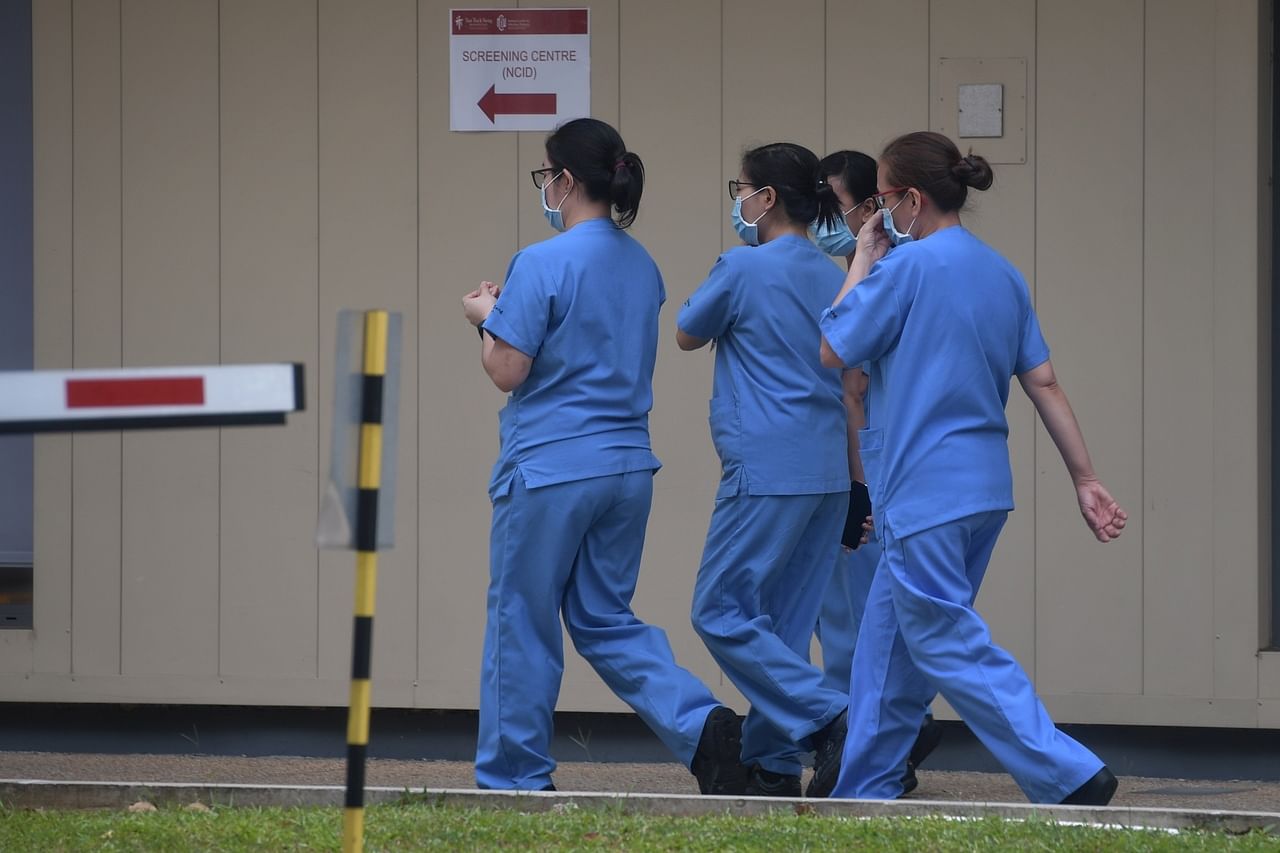Faced with staffing crisis, hospitals in Singapore find ways to lighten nurses' Covid-19 load


SINGAPORE - Faced with a staffing crisis as healthcare workers quit amid a wave of Covid-19 infections that has lasted for months, hospitals are finding new ways to lighten nurses' loads, such as by training volunteers and administrative staff to take over some basic tasks.
At some hospitals, such as Ng Teng Fong General, these other staff or volunteers serve meals and clear trays so that nurses can focus on their core duties.
A spokesman for the National University Health System (NUHS) public healthcare cluster, which Ng Teng Fong General Hospital is a part of, said it wants to ensure that staff get adequate support, so as to reduce staff burnout.
"To combat exhaustion and reinforce support to staff, we are recruiting additional staff to boost manpower across the cluster both locally and internationally," he said.
He also said staff are advised to plan their leave early with their departments so that everyone gets his turn.
"While we have provided the option to carry over or encash unutilised leave, we encourage our staff to take leave to rest and recharge."
In Parliament on Nov 1, Senior Minister of State for Health Janil Puthucheary said that about 1,500 healthcare workers here quit in the first half of this year, compared with 2,000 a year before the pandemic.
To dissuade more staff from leaving and to motivate them, the public healthcare sector in July raised salaries for nurses, allied health professionals and administrative staff.
And on Friday, Health Minister Ong Ye Kung said that about 100,000 public healthcare workers will receive a special award amounting to $4,000 each for their hard work and sacrifices in fighting Covid-19.
Nurses' workloads have risen, particularly as the continued surge in cases has put more than 1,600 Covid-19 patients in hospital.
At Ng Teng Fong General Hospital in Jurong, more than 80 administrative staff have been trained to help ease the load in the general wards, said the NUHS spokesman.
These staff are volunteers, such as those in the National University Hospital's Covid-19 volunteer group, which has more than 90 members, most of them from administrative areas, to help with simple tasks such as ushering patients or visitors at the clinics, the spokesman said.
Alexandra Hospital has trained a group of its regular hospital volunteers to screen and swab visitors and caregivers. Hospitals have volunteers who befriend patients, but they have not been allowed into the wards since early last year.
National University Hospital and Alexandra Hospital are also under NUHS.
At Tan Tock Seng Hospital, non-nursing staff have signed up for training in basic nursing such as feeding patients or helping to turn them on their beds to prevent bedsores.
At a time when more nurses are needed, their numbers have fallen slightly. Last year, Singapore had 34,654 registered nurses and 7,442 enrolled nurses, compared with 34,609 registered nurses and 8,059 enrolled nurses the year before.
About a third of the nursing workforce here in 2019 were foreign nationals.
Ministry of Health data shows that there were 14,823 doctors last year, up from 14,279 in 2019.
Mr Ong has said that while Singapore has the infrastructure to set up more intensive care unit beds, manpower is a serious constraint. Adding more beds will not happen "without a major degradation of care", he warned.

With mobilising volunteers just a stopgap solution, hospitals are looking at how they can add to their numbers.
At SingHealth, apart from hiring locally and internationally, the cluster is continuing to hire under the professional conversion programmes for healthcare professionals and attract non-practising nurses to rejoin the workforce, said Ms Esther Tan, its group chief human resource officer.
She said the pandemic has led to a global shortage of healthcare manpower, which has made the recruitment and retention of healthcare professionals even more challenging than before.
"Much of our retention efforts focuses on supporting our healthcare professionals in their professional growth and development," she said.
This is also something that private group IHH Healthcare Singapore is focused on. Its nursing director Josephine Ong said the group continues to sponsor nurses for nursing diplomas, degrees and master's programmes while trying to attract more local hires.
Mrs Ong said non-nursing tasks that used to be part of nurses' duties are now performed by other departments, and since January, the group has employed more healthcare assistants to augment its nursing workforce.
She said IHH is also looking at how technology, such as artificial intelligence and robotics, may present sustainable solutions to staffing shortages.
"Working longer shifts is not the solution to cope with the shortage of nurses as nurses need adequate rest and support to do their best for patients."
Mrs Ong said the pandemic will worsen the healthcare manpower situation as more nurses are needed to set up and run Covid-19 wards and care facilities, swabbing exercises and vaccination projects.
"As we move into the endemic phase and more medical procedures and healthcare services resume, the demand for nurses will only continue to increase," she said.
"Foreign nurses will continue to be a major source of nursing manpower until we can significantly increase the local supply of nurses."
This article was first published in The Straits Times. Permission required for reproduction.